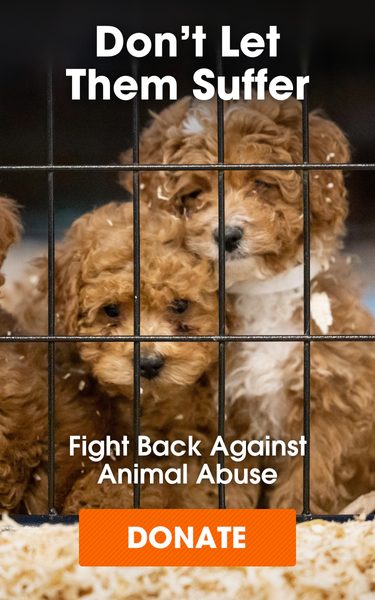There’s a reason the puppy mill industry doesn’t show you where their puppies come from. To turn a profit, corners need to be cut, and it’s the dogs imprisoned in puppy mills who pay the price both physically and emotionally.
Puppies born into this sad world are comparatively lucky in one way: because they need to be sold while they’re small and young, the time they spend in these facilities is brief. Unfortunately, the effects of where and how they were bred last a lifetime. Poor genetics, early weaning, unsanitary environments and significant stress can contribute to the development of serious health and behavioral problems that are expensive, difficult or impossible to treat.
Constant Fear and Stress
Lack of normal human interaction hurts typically social animals like dogs. Dogs kept in commercial breeding facilities may pace back and forth in their cages, bark nonstop, cower or appear entirely shut down. Since puppy mills only plan on selling puppies, there is little incentive to provide much physical or emotional care to the adult breeding dogs.
Set Up for Failure
Cruel breeders want to produce as many puppies as possible as quickly as possible. Unlike responsible breeders, they don’t screen for inheritable disorders and remove dogs from their breeding program who are less likely to produce healthy puppies. Even psychological issues like anxiety and fearfulness can have genetic roots. And it only makes sense that, just like with humans, an unborn baby might be affected by a mother’s stress: Stressful puppy mill conditions that hurt mom, which include being bred constantly without any rest time, can potentially also harm her puppies.
Sudden Separation
The first months of puppies’ lives are a critical socialization period. Spending that time with their mother and littermates, along with slow weaning, helps prevent problems like extreme shyness, aggression, fear and anxiety. But puppies born in puppy mills are usually removed abruptly from their littermates and mothers at very early ages. This can cause underdevelopment and long-lasting emotional and behavior problems.
Alone in a Crowd
Puppies from cruel breeders are often shipped, typically by truck and sometimes over long distances, to brokers and eventually to pet stores. Puppies might also be shipped by plane. The transport is noisy, may be too hot or cold, and smells of other dogs and their comingled waste. The young puppy is now housed with unrelated dogs in an unfamiliar place without his mother or littermates. He might feel hungry, thirsty, scared or sick. The puppy can be exposed to illness and disease. At the pet store, the puppy is again put into new, unfamiliar surroundings and handled by many different people. This is not a promising way to start a new life.
Sources available upon request; contact [email protected] with specific questions about this content.


